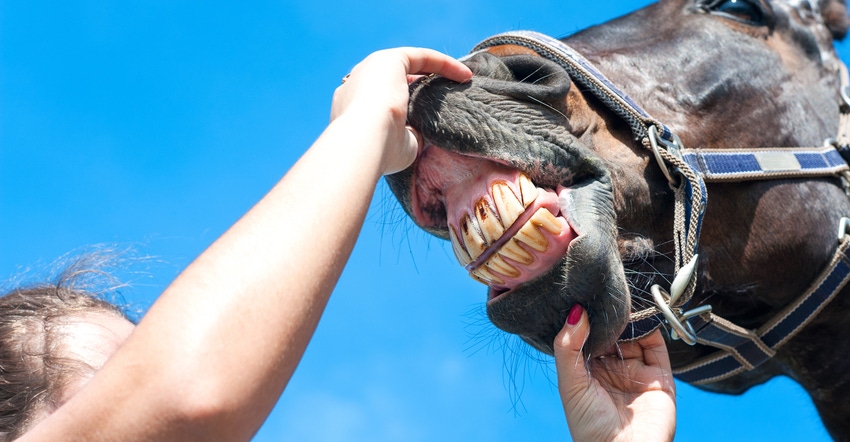
When it comes to animal health and productivity, one of the most important factors is how that animal is eating. And just like a human being, if a cow or horse or goat has issues with its teeth, that animal is not going to eat well.
Good dental health can keep each animal at a healthy weight and performing at its best. Though livestock owners don’t hire dentists to give cows, sheep, goats or hogs an annual checkup, dental care can be managed into the health routine for any species.
My father, Ron Nida, was a large-animal veterinarian for 34 years before selling his practice and beginning a career with U.S. Department of Ag’s Food Safety and Inspection Service. I remember as a kid seeing an older cow on our farm gum her feed or hay, and the grain would fall out of her mouth, undigested. Dad said, “If she is losing her teeth, then she goes to town.”
That reality was confirmed during my interview with Hutchinson vet Ron Keeler. Keeler is from Pretty Prairie and earned a doctorate in veterinary medicine from Kansas State University in 1994. His rural practice, called Ninnescah Veterinary Service, specializes in small animals and horses.
“Cows can’t chew or graze as well as horses because their incisors are only on the bottom, not top,” Keeler says. “When they wear down to nothing, she’ll start gumming grass. And when she gets to the point that she can’t maintain body condition because her teeth won’t allow her to have proper intake, then it’s time to ship her.”
The same applies to sheep and goats. Keeler says sometimes a boar’s tusks must be cut for safety, but otherwise dental care is not needed in swine. A quick look at the teeth of a ruminant animal is enough to determine if they can consume grass and grain properly, and if not, their days are numbered. Keeler says if a cow is grazing on pasture with sandy or rocky soil, then her teeth might wear down faster. Sand, he says, is abrasive enough to age teeth faster on bovines.
“It’s something we just accept,” Keeler says.
Dental care in horses is an issue Keeler addressed on a daily basis. Horses will grind their teeth down to a crooked level, and when this happens, the horse should be sedated, then have its teeth floated. When a horse owner notices the animal dropping grain, rather than eating it, this indicates a need to have the horse’s teeth floated, or filed down, to remove sharp points on the edges of its teeth that would otherwise cut its tongue or gums. Keeler says this varies for every horse; some need it done once a year and others every three years.
There is also a need to check wolf teeth in horses. These teeth are in an area where the bit sits and should be removed. Keeler says wolf teeth are like wisdom teeth, but are in the front of a horse’s mouth, not the back. Typically when he castrates a horse, Keeler will also check for wolf teeth, which are tiny teeth that can cause a big problem.
Watching for signs of dental issues in livestock is an important part of keeping the animal in good physical condition. If the cow, sheep or goat can’t consume, profitability will decrease, and it will be time to cull them from the herd. Horses can have their teeth managed on a regular basis, which will extend their livelihood on the farm or ranch. There is no magic toothbrush to fix dental issues in livestock, but keeping a watchful eye out is the next best thing.
McCurry writes from Colwich.
About the Author(s)
You May Also Like




